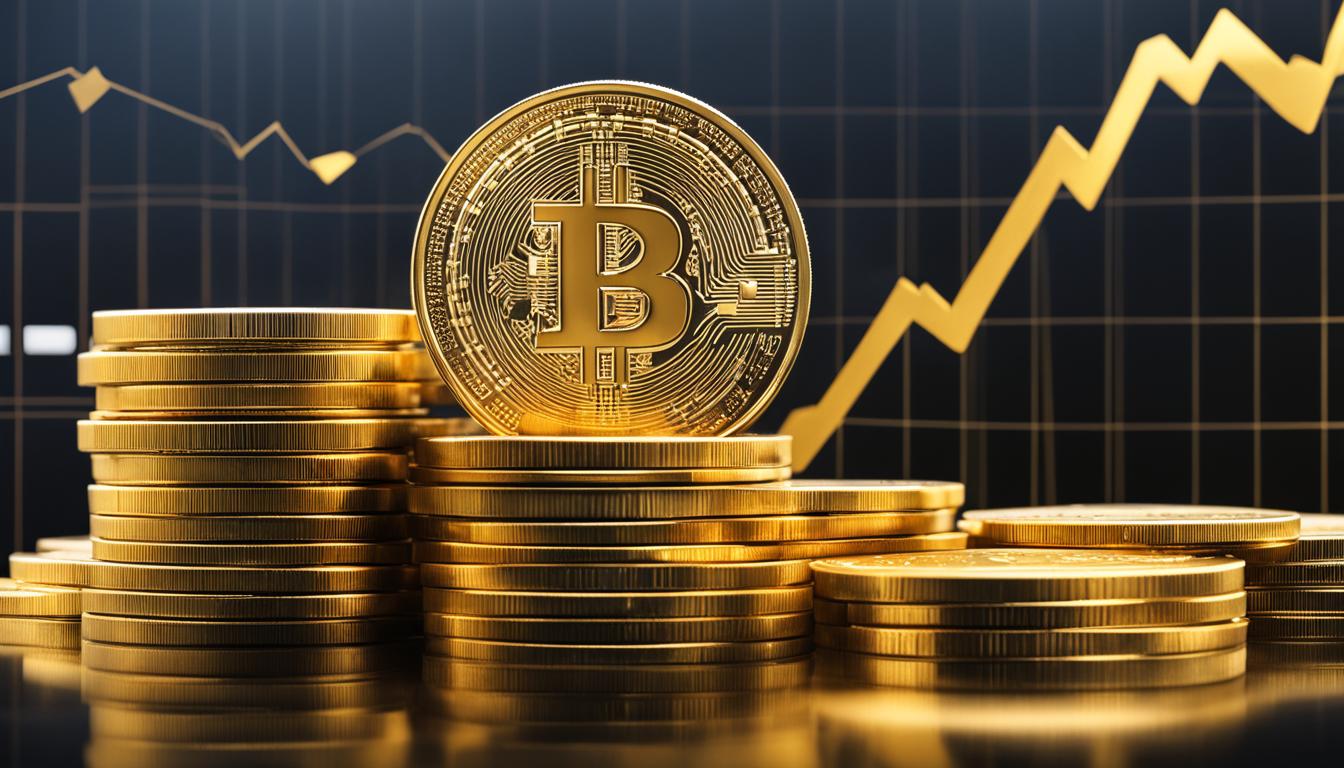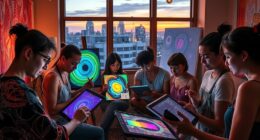A screenplay written entirely by AI has won a major film festival award, catching Hollywood’s attention. This milestone shows AI’s growing ability to create award-winning stories, sparking debates about creativity, ownership, and authenticity in filmmaking. Industry insiders are reevaluating what counts as art and how technology will shape future movies. If you keep exploring, you’ll discover how this breakthrough could transform Hollywood’s creative landscape and what it means for filmmakers everywhere.
Key Takeaways
- An AI-generated screenplay winning a film festival marks a breakthrough in AI-driven creative storytelling.
- This achievement prompts Hollywood to reconsider AI’s potential in producing award-winning cinema.
- It raises ethical questions about ownership, intellectual property, and the role of human creators.
- Advances in visual quality and authenticity boost AI’s acceptance in filmmaking and audience engagement.
- The milestone sparks industry debates on authenticity, emotional depth, and the future integration of AI in film.

In a surprising turn of events, an AI-generated screenplay has won top honors at the recent film festival, marking a significant milestone in the intersection of artificial intelligence and creative storytelling. As you watch this groundbreaking achievement unfold, it prompts you to consider deeper questions about the future of art and the role of technology in creativity. The victory sparks conversations about how AI can augment, or even challenge, traditional notions of storytelling, but it also raises pressing ethical implications that you can’t ignore. For instance, who truly owns the creative work when a machine, rather than a human, writes the script? This question touches on intellectual property rights and the moral responsibilities tied to AI-generated content. Furthermore, you might wonder whether the use of AI diminishes the value of human creativity or whether it can serve as a tool to enhance storytelling rather than replace it. These ethical considerations are vital as you navigate a landscape where machines become collaborators in artistic endeavors.
At the same time, the notion of creative authenticity comes into play. You might ask yourself if an AI-produced screenplay can genuinely evoke the emotional depth that human writers often craft through personal experience and cultural nuance. Authenticity is a core ingredient for meaningful art, and many critics argue that AI, despite its impressive capabilities, lacks the consciousness or lived experience necessary to produce truly authentic storytelling. Yet, supporters contend that AI can analyze vast amounts of data to generate innovative ideas and structures that might be difficult for humans to conceive alone. As you process this, you realize that the debate isn’t just about technology but about what we value most in storytelling: emotional resonance, originality, or perhaps a blend of both. Additionally, advancements in color accuracy and visual quality can influence how convincingly an AI-generated screenplay is translated into a compelling visual experience on screen.
This achievement at the festival signals a shift in Hollywood’s perspective, where AI no longer merely assists but can produce award-winning work. You see industry insiders beginning to rethink their definitions of creativity, authenticity, and ownership. While some celebrate the technological breakthrough, others remain cautious, emphasizing the importance of maintaining human oversight to preserve the integrity of storytelling. As you witness Hollywood taking notice, it’s clear that the landscape of filmmaking is on the verge of transformation. AI’s role will certainly evolve, but as you consider these developments, it’s essential to stay mindful of the ethical implications and the importance of safeguarding creative authenticity. Only then can the industry truly harness AI’s potential without compromising the human spirit that makes storytelling so powerful.
Frequently Asked Questions
How Does Ai-Generated Content Influence Traditional Screenwriting Careers?
AI-generated content influences your screenwriting career by introducing new tools powered by machine learning, which can streamline your creative process. Instead of replacing you, these tools foster creative collaboration, helping you generate ideas, refine scripts, and explore innovative storytelling techniques. Embracing AI allows you to stay competitive, enhance productivity, and push creative boundaries, ensuring you remain relevant in a rapidly evolving industry that values technological integration.
What Ethical Concerns Arise From Ai-Written Scripts Winning Awards?
You might wonder if AI-written scripts winning awards threaten authorship authenticity and artistic integrity. The concern is, as AI blurs creative lines, can we truly trust the originality behind these works? This raises ethical questions about recognition, talent, and the value of human creativity. If AI takes top honors, you could feel uneasy about the future of genuine storytelling, risking a loss of personal touch in filmmaking’s heart.
Will AI Tools Replace Human Screenwriters in the Future?
You might worry AI tools will fully replace human screenwriters, but AI creativity is best used alongside human collaboration. AI can handle repetitive tasks and generate ideas quickly, freeing you to focus on storytelling nuances. While AI may automate certain aspects, human insight remains essential for emotional depth and originality. So, rather than replacement, expect a future where AI and humans work together to craft compelling scripts.
How Do Film Festivals Evaluate Ai-Created Works?
You’ll find that film festivals evaluate AI-created works based on their originality, storytelling quality, and technical execution. The judging panel considers these evaluation criteria carefully, just like with human-made films. They look for creativity and emotional impact, ensuring the AI’s contribution enhances the overall piece. So, if your AI-generated film impresses the panel with its innovation and artistry, it has a real chance to stand out and win recognition.
What Measures Ensure Originality in Ai-Generated Screenplays?
Like Da Vinci’s brushstrokes, your AI-generated screenplay must showcase genuine originality. To guarantee this, you implement rigorous originality verification, comparing the script against existing works, and address copyright concerns by clearly attributing AI contributions. These measures help confirm that your work isn’t just a copy but a fresh, creative expression, fostering trust among juries and audiences and safeguarding your creative integrity.
Conclusion
So, as you see, AI-written screenplays are starting to make waves in Hollywood. Will this shift challenge traditional storytelling or open new creative horizons? It’s clear that technology’s role in filmmaking is only growing. Embracing AI doesn’t mean replacing human talent, but enhancing it. Are you ready to see how this fusion of art and innovation transforms the future of cinema? One thing’s certain: the industry’s about to change in ways we’ve never imagined.











